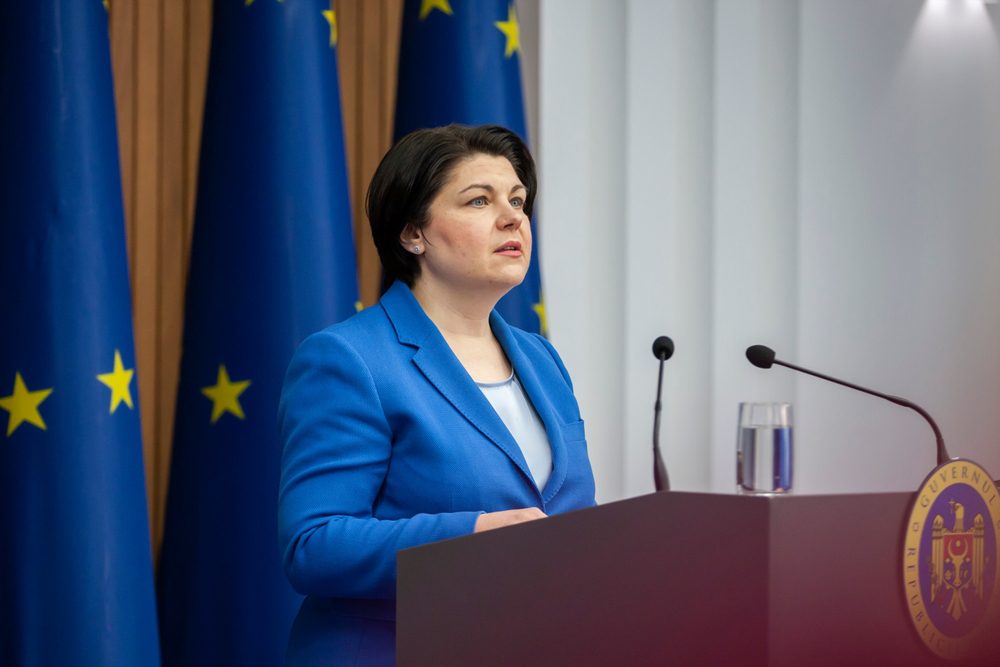
Moldovan Prime Minister Natalia Gavrilița resigns, Chișinău, 10 February 2022
After months of dealing with internal instability and political unrest, Moldovan Prime Minister Natalia Gavrilița announced her resignation, along with her entire cabinet, on Friday, February 10th, just hours after Russian missiles violated the country’s airspace.
“If our government had had the support at home as we had from our European partners, we could have advanced further and faster,” Gavrilița said at Friday’s surprise press conference. “Moldova is entering a new phase, one in which security is our priority.”
Due to its close proximity to the fight, the war in Ukraine amplified all existing political tensions in the small Eastern European country during the last year. Gavrilița’s announcement came only hours after two Russian missiles launched from the Black Sea flew over Moldovan airspace before hitting their targets in Ukraine. Following the incident, Moldovan Foreign minister Nicu Popescu summoned the Russian ambassador for an explanation. Initial reports mentioned the missiles crossing into Romanian—and therefore, NATO—airspace as well, which was later denied by the Romanian ministry of defense.
The resigning government belonged to the liberal pro-European party Action and Solidarity (PAS), which won a landslide victory in the 2021 parliamentary election after campaigning on an explicitly anti-corruption, anti-oligarchy, and pro-EU membership platform. Following the persistent negotiations of the Gavrilița cabinet, Moldova was granted European Union candidate status last June. Moldovan President, Maia Sandu—herself a founding member of PAS—said she would launch a consultation with parliamentary parties to appoint a new prime minister as soon as possible.
Much of the political pressure that led to the Moldovan cabinet’s eventual resignation is attributed to intentional Russian efforts to stoke anti-government feelings. Russia, which has military bases in the breakaway region of Transnistria, has long been accused by Gavrilița of stirring unrest in the country, including organizing protests in Chișinău, as well as using economic instruments to turn up the heat around the EU-aspiring Moldovan leadership.
Just a day before the resignation, Ukrainian President Volodymyr Zelensky told EU leaders at the Brussels’ European Council summit that Ukraine had “intercepted Russian plans to ‘destroy’ Moldova.” Later that day, Moldovan intelligence confirmed identifying subversive activities aimed at “undermining the state of the Republic of Moldova, destabilizing and violating public order.”
Despite the pre-existing instability, the government’s collapse comes as a surprise. It has been only days since PM Gavrilița met with European Council President Charles Michel and EC President Ursula von der Leyen in Brussels to discuss her country’s EU membership prospects. “Moldova can keep counting on the EU,” Von der Leyen tweeted after the meeting on February 6, but—depending on who will form the new Moldovan government—a smooth accession process is far from being certain.
Moldova can keep on counting on the EU, I told PM @natgavrilita
— Ursula von der Leyen (@vonderleyen) February 6, 2023
We proposed €145 million in new funding just last week and continue to support your economy and energy security.
As 🇲🇩 progresses on its EU reform path, we are now working to get you closer to our Single Market. pic.twitter.com/IUocFFwB7A
Wedged between Ukraine and NATO-member Romania, Moldova has found itself in a perilous situation ever since the Russian invasion started last February. Since then, security has become a key issue for Moldovans, but the country is being divided over how to deal with it. Noting Moldova’s unilateral military neutrality, some officials believe Russia must not be provoked by ramping up defense capabilities and seeking military assistance abroad, while others—including President Sandu—consider joining a defense alliance as soon as the majority of the population is behind it.
“Now there is a serious discussion … about our capacity to defend ourselves, whether we can do it ourselves, or whether we should be part of a larger alliance,” Sandu told Politico last month. “And if we come, at some point, to the conclusion as a nation that we need to change neutrality, this should happen through a democratic process.”
Joining NATO, however, normally takes years. Additionally, Moldova’s frozen conflict with Transnistria theoretically prevents it from entering the Atlantic Organization for the foreseeable future. Nonetheless, Moldova might have a different route: reunification with Romania, which is already part of the western security establishment. Automatic NATO membership is precisely why talks about reunification have multiplied in Chișinău in recent months, causing concerns in Moscow. Bucharest has been traditionally dismissive of the idea of reunification, but according to Moldovan sources, President Klaus Iohannis not only changed Romania’s mind but is actively lobbying for Brussels’ approval.
